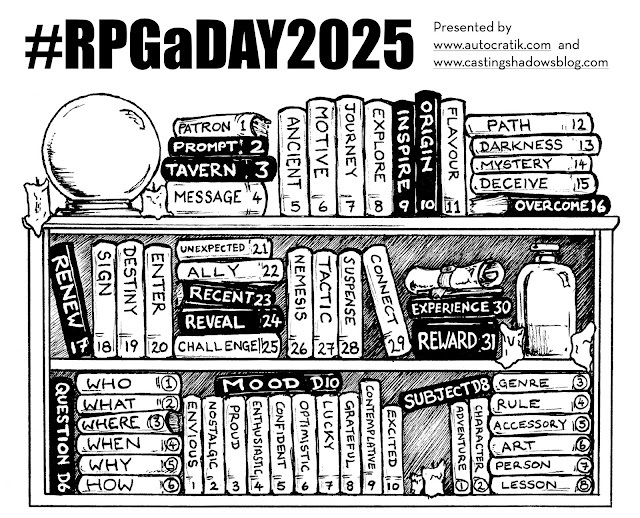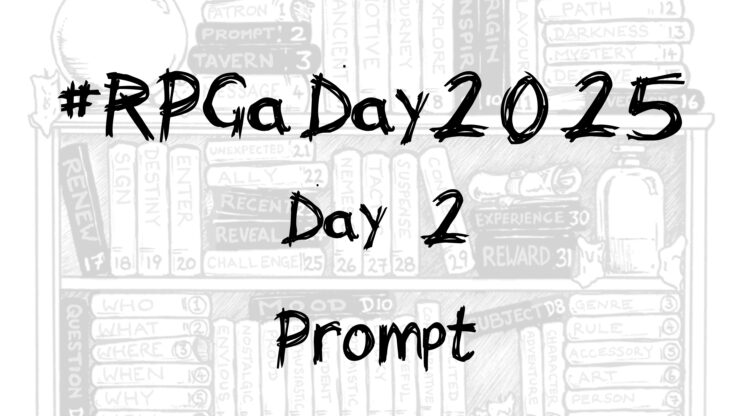Welcome back to day 2 of RPG a Day 2025. Happy Saturday!

In a very meta way, the prompt for today is Prompt. Like yesterday, let’s go to the Merriam-Webster dictionary for the definition:
prompt (verb)
- to move to action: incite
- to assist (one acting or reciting) by suggesting or saying the next words of something forgotten or imperfectly learned: cue
- to serve as the inciting cause of evidence prompting an investigation
All these definitions serve the purpose of what I want to talk about today. How do you prompt your players to action?
I appreciate how modern games are evolving rules around player agency, moving us towards a more egalitarian relationship between the Game Master (or Storyteller, Referee, Arbiter) and players. However, not all games do so; some classic games still enforce more traditional roles for the GM/Player divide. And some of us who grew up playing in the 80s are set in our ways, and it takes time and effort to break the paradigm.
What do you do when there is a lull in the action, when you look at your players and ask them what they want to do, and all you see are blank stares? Or when you offer a variety of choices to players and there is analysis paralysis?
Ideally, you plan, you seed ideas and motivations, you empower players to make decisions and dictate the direction the adventure will take, but even the most prepared GM faces this situation, you are stuck with players who don’t know what to do, and even worse, you may not know what to do!
So, besides outright asking your players, “What do you do?” How do you prompt your players to action?
Here are some of the tricks that work for me:
I always encourage players to develop a backstory for their characters. Some write detailed short stories with accompanying illustrations, others jot down a few salient points, and others just tell me a few sentences on who they think their character is, regardless of the details. I take notes on all of them. If the details are not there, I ask a few questions: what are your goals, what do you want to achieve, and are there any enemies or friends?
Then I use the details for my notes. Not detailed notes. I make a table with some categories. The categories depend on the campaign, but often include origin, motivation, goal, enemy, ally, and updating that table as the game progresses. I also keep a list of similar elements of the group as a whole, including group goals, enemies, allies, and so on.
These notes are helpful when creating storylines, when remembering to tie the character’s background and motivation to events on the campaign, but they are also handy as prompts! I can look at the table and find a detail, motivation, or NPC that can serve as a prompt. See, this dovetails back to yesterday’s post on Patrons. Character’s not sure where to go or where to explore next? Their patron is kidnapped!
I’ll admit I did that far too often in a campaign. The players made fun of me every time their patron was kidnapped again! I was a younger GM back then 😉
I also listen to the players’ expectations, when they are talking, in character or among themselves, their theories or suspicions can be the seeds of your prompts. You described an ash-filled room, much like flavor, when you are describing random free association, and players suddenly suspect a hellhound is around. When the action lulls a few rooms later, lo and behold, hellhounds attack.
Random tables are great for generating a prompt to motivate action. If you have the time to create ideas, encounters, situations, or locations ahead of time, you can drop them into the game when there is a lull in the action, making them valuable tools for the GM. I’m particularly fond of the tools Kevin Crawford uses in his Without Numbers games from Sine Nomine Publishing, such as Stars, Worlds, Cities, and Ashes Without Number, which cater to Sci-Fi, Fantasy, Cyberpunk, and Post-Apocalyptic genres, respectively. There is something for everyone, and there are free versions of all his books. Click on the links above for the free versions, but these books are great, and I wholeheartedly recommend the paid versions and the physical copies.
The last tool I use is Google. If I am stumped, I ask Google to: “Generate a random noun, adjective, and verb” and use that as inspiration. Let me see what I get: chair, happy, dance. I then use the three words to come up with an idea. Off the top of my head, depending on the game, it could be “You see elves frolic in the words dancing around an ancient stone chair” for a fantasy game. For horror, “In the closet, you hear someone sing an off-key happy tune, when you look inside, there is a man, sitting on a chair, grinning happily, yet crying.”
The next results: potato, worried, decide. What would you do with that result?
What prompts do you use in your games? How do you motivate your players in the sessions? I want to hear your ideas.
Leave your thoughts in the comments, or tag me in your replies, wherever you make them. If you choose to participate, don’t forget to tag your participation with the #RPGaDay2025 hashtag so the community at large can find your posts.


